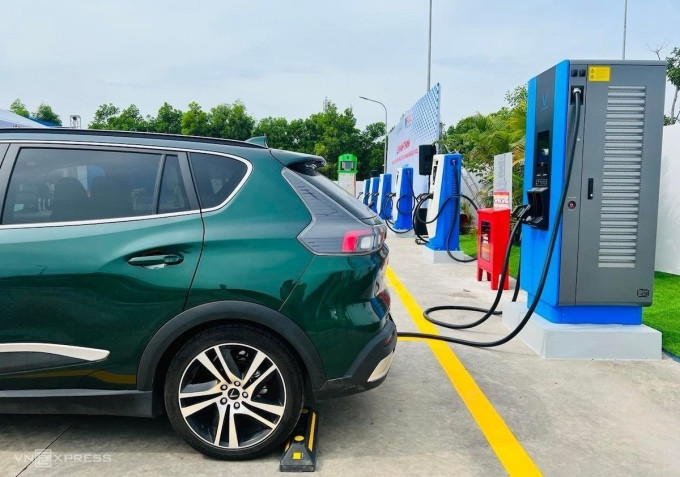Installing charging stations and promoting non-gasoline services are ways many domestic fuel retailers are coping with the development trend of electric vehicles.

Over the past two years, the petroleum market has been constantly fluctuating. Many large enterprises in the fuel retail sector such as the Vietnam National Petroleum Group (Petrolimex) and the Vietnam Oil Corporation (PVOIL) have maintained their market share, but face the risk of decline if the trend of electric vehicles replacing gasoline and diesel cars increases rapidly.
According to the Ministry of Industry and Trade, sales of electric motorbikes in Vietnam have increased by about 30-35% in recent years, making Vietnam the largest electric motorbike (E2W) market in the ASEAN region and second globally after China. The electric car market is also bustling, with sales of brands last year increasing by nearly 115% compared to the same period last year, reaching about 18,000 units, according to data from the Vietnam Automobile Manufacturers Association (VAMA).
The rapid increase in electric vehicles has oil giants worried about their market share being affected and looking for ways to adapt. At a recent shareholders' meeting, leaders of Petrolimex and PVOil both said that electric vehicles are not a big risk to the oil market at this time. However, they also acknowledged that this trend will affect and compete with domestic fuel sellers after 2030.
"PVOIL hired domestic and foreign consultants to adapt to this issue," said Mr. Cao Hoai Duong, Chairman of the Board of Directors (BOD) of PVOIL.
To prepare for this, the petroleum company, which accounts for nearly 30% of the domestic market share, said it will focus on developing non-oil services. Accordingly, the company cooperates with many partners to integrate convenient services such as fast food, pho, coffee, car wash, car and motorbike repair, etc. They also aim to cooperate with Singaporean partners to collect used cooking oil from households and industrial kitchens for export to this country.
According to experts, Vietnam will not be left out of the electric vehicle game, because this is the top choice in the world, thanks to its outstanding advantages over gasoline vehicles such as technology, durability, usage and rolling costs. At the same time, the trend of protecting the environment through transportation is being enthusiastically responded to in the world and is increasingly spreading to Vietnam.
In addition to developing non-oil services, petroleum retail businesses are looking to join hands with electric vehicle manufacturers. Since July 2022, PVOIL has cooperated with VinFast to develop charging stations to take advantage of the opportunities brought by electric vehicles. To date, more than 322 gas stations belonging to this business have electric vehicle charging stations.
This cooperation, according to PVOIL leaders, creates good revenue and profit for their member units. "There are stores that profit from cooperation in opening charging stations equal to the profit of a unit selling 300 m3 of gasoline per month," Mr. Duong said at a meeting with investors at the end of this month.
Similarly, Petrolimex - a "giant" with more than 50% market share - said it is studying investment opportunities, developing the charging station market and value-added services. The group is also considering developing high-quality green energy products. By 2030, the group aims to have 50% of its revenue from these products and increase to 100% by 2045.
This year, Petrolimex plans to achieve consolidated revenue of VND188,000 billion and pre-tax profit of VND2,900 billion. These levels are down 32% and 26% respectively compared to last year. As for PVOIL, its consolidated revenue target is VND83,000 billion, down 19% compared to the same period.
Not only Vietnamese enterprises, but also large oil and gas corporations in the world must transform themselves to adapt to the competition brought by electric vehicles.In China, gasoline demand is forecast to fall by half by 2045. Two fuel giants, Sinopec and PetroChina, have had to change their business strategies.
According toReutersSinopec, which will operate 21,000 charging stations by the end of 2023, has earmarked 18.4 billion yuan (about $2.55 billion) to build an integrated energy station network, up 17% from last year. The group plans to build 5,000 charging stations by 2025.
PetroChina, which operates 28,000 charging points through its subsidiary Potevio New Energy, said it will focus on comprehensive stations that provide oil, gas, hydrogen and charging. The company plans to build 1,000 more EV battery swapping stations this year.
Energy companies such as Shell (UK) and Total Energies (France) are looking to transform themselves in the face of the rise of electric vehicles. Shell plans to close 1,000 gas and oil stations to focus on developing charging stations globally. The company plans to open about 16,000 more charging points, bringing the number of electric vehicle charging stations to 70,000 by 2025. Shell is also developing charging stations that come with coffee, food and other convenience items.
NH (according to VnExpress)